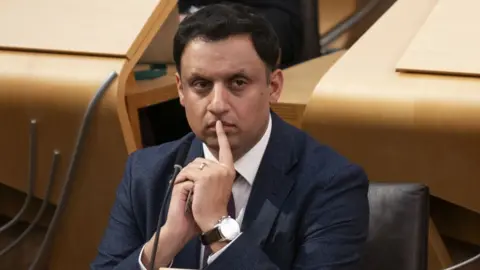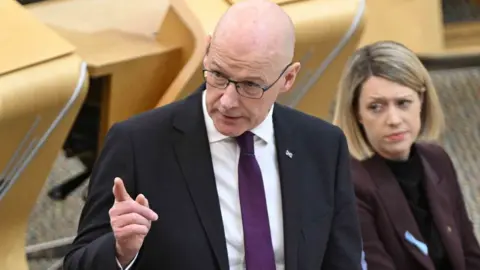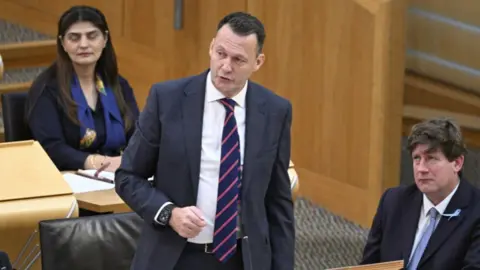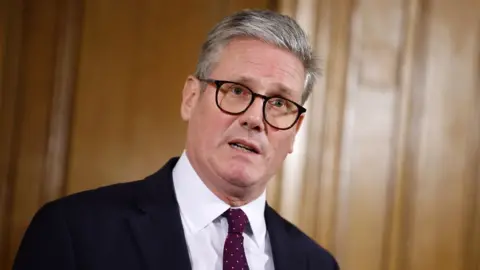Rebel Labour MSPs back SNP in winter fuel payment vote
 PA Media
PA MediaTwo Scottish Labour MSPs have rebelled against their leader in a Holyrood vote calling on the UK government to reverse a cut to winter fuel payments.
First Minister John Swinney's non-binding motion - which demands Westminster scraps the decision to make the benefit means tested - passed by 99 votes to 14.
Former Scottish Labour leader Richard Leonard and Alex Rowley, who stepped down from the frontbench last month, backed the motion, as did all of the other parties.
A Scottish Labour amendment which removed the call for a U-turn was voted down.
The party instead called on the Scottish government to reinstate the fuel insecurity fund to support pensioners.
While Scottish Labour leader Anas Sarwar said he believed the means tested criteria for the benefit was “too tight”, he defended Prime Minister Sir Keir Starmer's decision.
After the UK government cut universal winter fuel payments for millions of pensioners south of the border, the Scottish government said it had no choice but to follow suit in introducing means testing - meaning it will only be given to those receiving pension credit.
It is expected to result in about 900,000 fewer pensioners in Scotland getting the payment.
After the vote, SNP MSP Clare Haughey said: "Today Anas Sarwar made his choice - it is more important for him to lie down for Sir Keir Starmer than stand up for vulnerable pensioners in Scotland.”
Meanwhile the first minister said the Scottish government had been “forced” to cut universal entitlement for winter fuel payments because the Labour government’s decision meant Holyrood would lose out on about £150m in Treasury funding.
He said that money would have provided about 80% of the funding for a new a Holyrood-managed equivalent - the pension age winter heating payment (PAWHP) - which was scheduled to be introduced last month.
The payment has been pushed back to winter 2025.
Swinney called on the prime minister to reverse the UK government's "damaging" decision, which he said was "not in the spirit of devolution”.
He warned vulnerable pensioners were facing the “double whammy” of increased energy costs and the winter fuel payment cut.
 PA Media
PA MediaMeanwhile Sarwar told MSPs: "This is a decision that the Labour government did not want to make but they are not responsible for the chaos and damage inherited for the Tories.
"And why the SNP of all people want to minimise the damage the Tories have done is for them to explain.”
A Labour amendment to Swinney's motion removed the demand for the means testing to be scrapped, and instead welcomed the UK government’s decision to extend the household support fund.
It said this would deliver an estimated £41m in Barnett consequential funding for the Scottish government.
Fuel insecurity fund
Labour called on SNP ministers to use that funding to finance a package of support to help low-income pensioners and households by re-establishing the fuel insecurity fund.
The fund, which has been allocated no money in the 2024-25 budget, was used to support the most vulnerable households over the winter and cost £30m last year.
Swinney said the Scottish government was yet to receive that consequential funding from the household support fund.
Only 16 of Labour’s 22 MSPs backed the amendment. Some members of the group were “slipped” – meaning they had permission to be absent.
A Scottish Labour spokesman said: “Today Scottish Labour voted for plans that would have seen low-income pensioners currently ineligible for pension credit and those on low incomes receive support and the SNP’s axing of the winter insecurity fund reversed.
“Instead of focusing on what it can’t do, the Scottish government could implement Labour’s proposals to make sure the most vulnerable are protected.”
 PA Media
PA MediaAn unsuccessful Conservative amendment added that the Scottish government must also reverse the introduction of means testing for winter fuel payments and criticised the SNP’s record of tackling poverty.
Scottish Tory leader Russell Findlay said there was "palpable” anger at Labour across the UK.
He said: “Elderly folk who have slogged hard all their days feel absolutely betrayed."
Findlay also condemned the prime minister's "shocking" admission that his government did not carry out an impact assessment on the winter fuel payment cut.
He added: "In depths of a long, cold Scottish winter we know that the winter fuel payments can be the difference between heating and eating.”
 PA Media
PA MediaAge UK has said that more than a third of pensioners entitled to pension credit do not receive it.
A report published this week by the Joseph Rowntree Foundation said a lack of action from the UK and Scottish governments was keeping more than one million people in Scotland in poverty, including about 240,000 children.
Starmer previously said means testing winter fuel payments could help reduce a £22bn "black hole" in the country's finances.
He issued a "guarantee" that an increase in the state pension - which is set to rise by £460 per year - would "outstrip" losses for those who will not not receive the winter fuel payment, which is either £200 or £300.
However, the state pension is not set to increase until April, and will be spread over the the following year.
A UK government spokesperson said: "We are committed to supporting pensioners - with millions set to see their state pension rise by up to £1,700 this parliament through our commitment to the triple lock.
"Over a million pensioners will still receive the winter fuel payment, and our drive to boost pension credit take up has already seen a 152% increase in claims.
"Many others will also benefit from the £150 warm home discount to help with energy bills over winter, while our extension of the household support fund will help with the cost of food, heating and bills."

A key point of this debate was to inflict maximum embarrassment on the Labour party.
Privately some anti-poverty charities have expressed a wish that the Scottish government debate had focused more on policy than on party politicking.
But nevertheless the tactic flushed out two Labour rebels.
Richard Leonard and Alex Rowley voted with the SNP to call for the UK government to reverse the introduction of means testing for the winter fuel payment.
The pair are well-known left-wingers and neither holds a front-bench position.
So what's perhaps more surprising is that Labour decided to vote against the motion, rather than simply abstaining and highlighting their own amendment, which called for a package of support for low-income pensioners.
Just 16 of their 22 MSPs voted, the other six had been "slipped", which means they'd been given permission by the whips to be absent.
It may be that some of them had pressing engagements elsewhere. Or it may have been a way of saving face.

